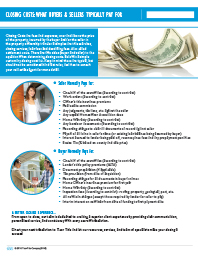Why do I need Title Insurance? Good question. And there are many good answers. Title insurance is one of those things that property owners may not appreciate until it comes time to make a claim. And when a claim is covered, that property owner thanks their lucky stars (and their Title insurer) because claims can be very costly.
Here is one scenario that illustrates why having title insurance with a company that has a large claims reserve is a good thing:
Johnny Home Owner took out a line of credit loan which was secured by his property in the form of a Deed of Trust. Some time later, Johnny Home Owner sold the property to Sally Home Buyer. The sale closed in a seemingly normal fashion and Sally Moved in and proceeded to make her house payments on time.
The Hitch:
A step in the closing process was inadvertently missed, allowing Johnny to continue to draw thousands of dollars of funds from the Line of Credit which was still secured by the property that is now owned by Sally. “What?,” you ask. How is this possible?
The step that was overlooked:
Specifically with a Line of Credit, the borrower (Johnny) needed to send a written statement to the lender in order to close the line of credit. Unlike a regular loan attached to a deed of trust, a Line of Credit cannot be closed without a written statement from the borrower (Johnny). The lender will not release the property now owned by the buyer, without that written notification.
Sally Home Buyer went into foreclosure:
Months after moving into her new home, Sally received a foreclosure notice against her new property from a lender that she didn’t recognize. Alarmed, she investigated and discovered that Johnny’s Line of Credit is attached to the property and in default.
Never fear, Sally Home Buyer has Ticor Title Insurance…
Sally, alerted Ticor Title of the foreclosure against her property due to the previous owner’s outstanding Line of Credit. Ticor evaluated the situation and in this case took steps to stop the foreclosure, eliminate the Line of Credit, and remove the cloud on title.
The moral of the story:
Choosing a title company with a hefty claims reserve will make all the difference in the world when it comes time to cover a claim. Ticor Title as a member of the FNF family of companies, has the nations deepest claims reserves at $2.6 Billion dollars. The choice is yours!
If you have questions about title insurance, you can call or text us at 253-318-1909.
This story was provided by Gregg Colbo, Senior Underwriter, Ticor Title. This story is based on real life circumstances. However, the names of the people in this story are ficticious and were chosen randomly. The intent of this article is to illustrate the value of title insurance.
